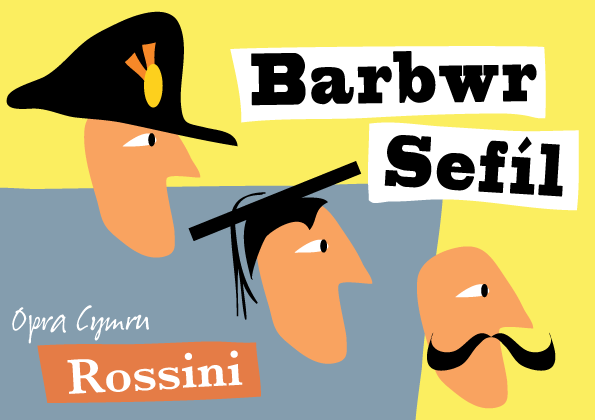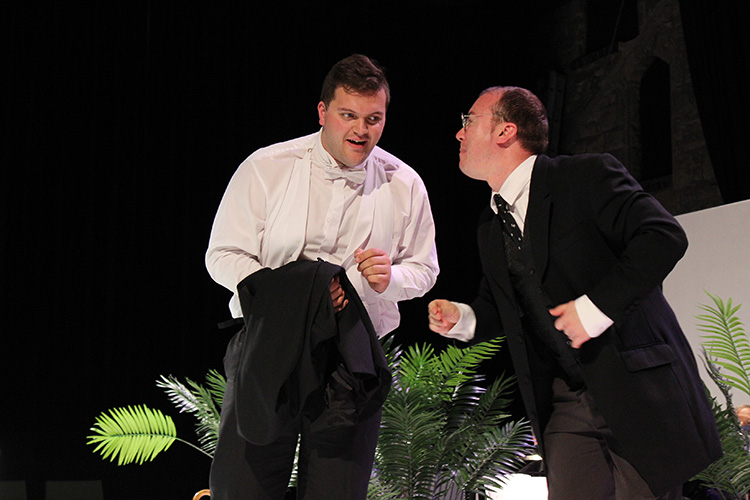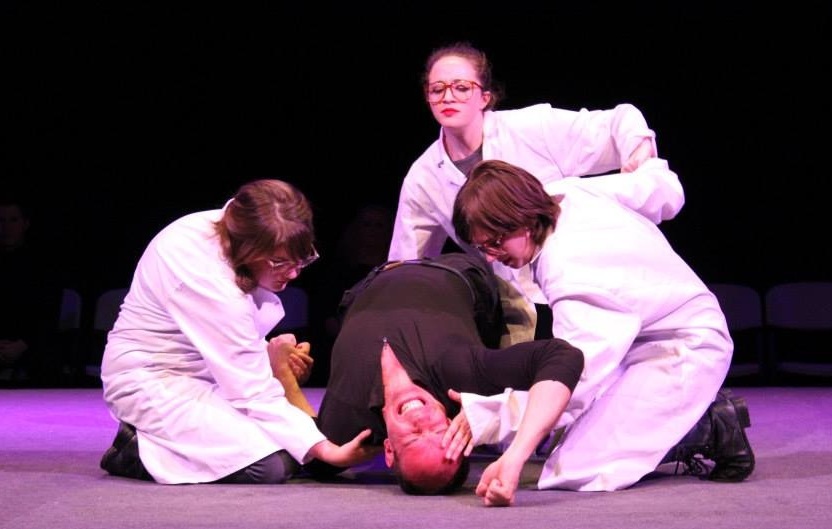OPRA Cymru is a unique Welsh-language opera company. It mounted its first production with a tour in Spring 2010 of Carmen. Gan Bwyll! Don Pascwale followed in 2011 and, for audiences this side of the Atlantic, the less familiar Macbeth in 2012.
Macbeth was reprised this year and toured with a new production, Barbwr Sefil, in September at venues from Bangor to Cardiff. Wales Arts Review’s Adam Somerset met company founders Sioned and Patrick Young before the second performance of the tour. The setting was the Committee Room in Aberaeron’s Memorial Hall an hour before the evening performance.

Adam Somerset: The productions of the previous years have come with an associated term of ‘democratic opera’. How does the concept run through what OPRA Cymru does or aspires to do?
Patrick Young: There are two things at work here. One is picking up the Shakespearean tradition. The way that Tyrone Guthrie did it, the idea of the imagination of the audience, the audience on three sides in the way that the Canadian Stratford stage was built. That’s one point. There’s a theatricality there. I was brought up in Edinburgh. And Guthrie found the General Assembly Hall of the Church of Scotland and thought it ideal for the way he wanted to do theatre. Thirty years later I ended up as a student working in that building during the Edinburgh Festival and seeing some of what they put on. It seemed to work in a very exciting way.
The second point is that opera has accrued over the years this association with – these are terrible words – snobbery, elitism and social division. And those don’t truly reflect the origins of opera, certainly not the history of opera in the nineteenth century in Italy. And possibly not in France either. And there’s a very long tradition of opera in Germany of what we would call musical theatre, dialogue followed by numbers, followed by dialogue followed by numbers so there’s an exchange all the time. This was regarded as Volkstheater – theatre of the people.
And I’m very taken by the idea, the fact, that opera is at its core universal: and so, how can you make that universality actually function? The question is do you make it function if it is part of a corporatist vision, or a marketised vision of the art, or do you make it function if you roll up your sleeves and take it to wherever you can, to reach as many people as possible?
Because of financial necessity, on our first tour we had a budget of practically zero to do it all – we were doing Carmen – and I thought we would do an arena-format production: we’ll have people all around. From that simple expedient to get the thing on, the idea all came back to me about Tyrone Guthrie’s Edinburgh Festival vision: so the idea of being able to go anywhere was reinforced. I was uncomfortable with the idea of playing opera on the actual stages of village halls across Wales because that would seem to me not to integrate the art form with the people of Wales enough: keeping audience and performers at a distance from each other. So the idea of democratisation wasn’t what we started with, but it is somehow what we’re ending up with, finding what we do is much more available, because we can do it anywhere. We can do it in a barn, in a multi-purpose arts centre, we can do it anywhere, but not so easily on a proscenium stage. We could adjust it, do it there as well, but that’s not what we currently want to do.

From a directorial point of view is there a particular challenge with the acoustic blocking of the singers? Your venues were never built with a high degree of acoustic sophistication.
PY: I do ponder this one every night. I am aware the singer turns his head away from me and I lose something, in volume, in dynamic range. I might even lose some of the text. As a director I’m aware of it in the rehearsal process and probably I should be more mathematical in what I do. But I like to think I am developing not an instinct exactly but an intuition about who’s getting enough of what, to keep something – in terms of the movement, the three-dimensional element, the movement on stage – of keeping that available to as many people in the auditorium as possible. You do rob Peter to pay Paul and in the process Paul and Peter have to get along, because they’re both subject to the same difficulty.
Is there an advantage in working with Welsh singers? There is a tradition here.
PY: Definitely. There is an ease our Welsh performers have which is tremendous. Add to that ease the fact that everything they say is in their mother tongue so they’re already performing very naturally. And it means of course they are listening to what the others are doing in a way that, if they were doing it in Russian, they might think, ‘I’ve got my text right and I don’t have to worry too much to what the other person is saying.’ But if you’re doing it all in your mother tongue then you’re aware of what everyone else is saying on stage. You become much more integrated. So yes, the fact that we have Welsh performers and they have an ease about being on stage, that really does help.
But it is a question whether we diminish the experience with an audience on three sides, because there are going to be times when you don’t get the full force of the soprano or the bass. I do think that if the audience is drawn in sufficiently, whatever they may lose on those occasions, they gain in other ways. Because it’s three-dimensional it’s very relational. Your characters are always relating. So an aria on its own on stage is not the best thing to have in our way of staging things. I try all the time to get arias to work in a relational way. Once you’ve established a relation between two characters on stage the audience does compensate, where it loses a bit of text or a bit of sound it makes up the difference itself.
On the language and the translations, you start from which sources?
Sioned Young: I start with the music, and listen to the Italian. Patrick works from the Italian text.
PY: I offer the literal information. The literalism. But I don’t know if that’s very helpful.
SY: The music leads to what the words should be. The music leads. And that is the challenge: probably I listen to the music more than anything else. I have to resolve how the words follow. With Macbeth I did look quite a bit at the Shakespeare. because it’s quite dense, the original libretto. Going back to the Shakespeare, that gave me a little bit more freedom in a way.
PY: There’s another key thing which is very important to both of us. We wanted it to sound like an original work. There’s been a tradition for a while in English translation of opera to somehow make it streetwise, or whatever, to give it a particular demotic slant. It happens quite often. And I’m a little uncomfortable with that, one because I think it dates very quickly, and also because it just doesn’t (reflect the original), and I heard of this with a production of Poppea at the Coliseum, where a line ended – and I can assure you it wasn’t this in Italian – it ended up with ‘f***ety f**k.’ And you start to think ‘there’s something going a bit wrong there.’ That’s one thing. But the key point is you want it to sound as though the music were written for the words so it’s really hand in glove with the music.
SY: That’s really important. That’s why I listen to the music a lot. Then I start to just do it. Although I want the meaning to come out, for me it’s the sound that matters.

One thing I noticed last year with Macbeth; English is characterised by more plosives, it’s not that Welsh does not have “t’s” and “d’s” but that they are less emphatic. And with the stress on the second syllable, and less dependence on plosives, I was wondering if Welsh was intrinsically more suited – and this is a layman’s view-in the way that Italian always sounds intrinsically more operatic than, say, German. The words in Macbeth did sound superior to English.
SY: I suppose. But we have had huge problems. With repeats, in particular.
PY: In Italian you obviously get elisions. Vowels fall off the end in the repeats, so the setting to the music may just not work when the music is developed and the text repeated. And so, you have to recalculate.
SY: And, in Welsh, we don’t have many words ending with vowels. There are times when I think ‘I’ve got that. It’s great’ and then suddenly you realise there’s a repeat of that particular word or phrase, with the rhythm ever so slightly altered, and you’re blocked. That, I suppose, is the main practical challenge.
PY: The other thing with English, it’s well-known, is the vowels. With the multi-purpose diphthongs all the time. Welsh doesn’t have that. It is very specific, as is Italian, about a vowel sound. With one or two exceptions. The letter ‘y’ tends to be a bit slippery, doesn’t it? But on the whole it’s got that vowel rigidity that really helps with singing, that makes it very clear. Our Carmen with the ‘ch’ sound didn’t have the gentleness that you find in the French. Italian is very focused on the double consonant and it’s very focused on the ‘rr’ sound. And it uses those two to kick the rhythm in a way. I really am a complete novice at this game. We’re sort of fumbling our way, we’re learning things as we go along. It’s very interesting.
Julian Barnes in his last essay collection had one on translating Madame Bovary. He quotes just thirteen words of Flaubert, and has six translations. Of course none of them are quite right because translations can never be exact because languages are never equivalent.
PY: The great problem is that you’re balancing meaning and rhythm.
So there is no generic Welsh versus English inherent musical appropriateness. Every translation is a battle of its own.
PY: That is about it.
Barbwr Sefil is reviewed on Theatre Wales/ Reviews of 14th September. The previous productions Macbeth and Don Pascwale may be found on Theatre Wales, 22 September 2012 and 10 September 2011 respectively.











